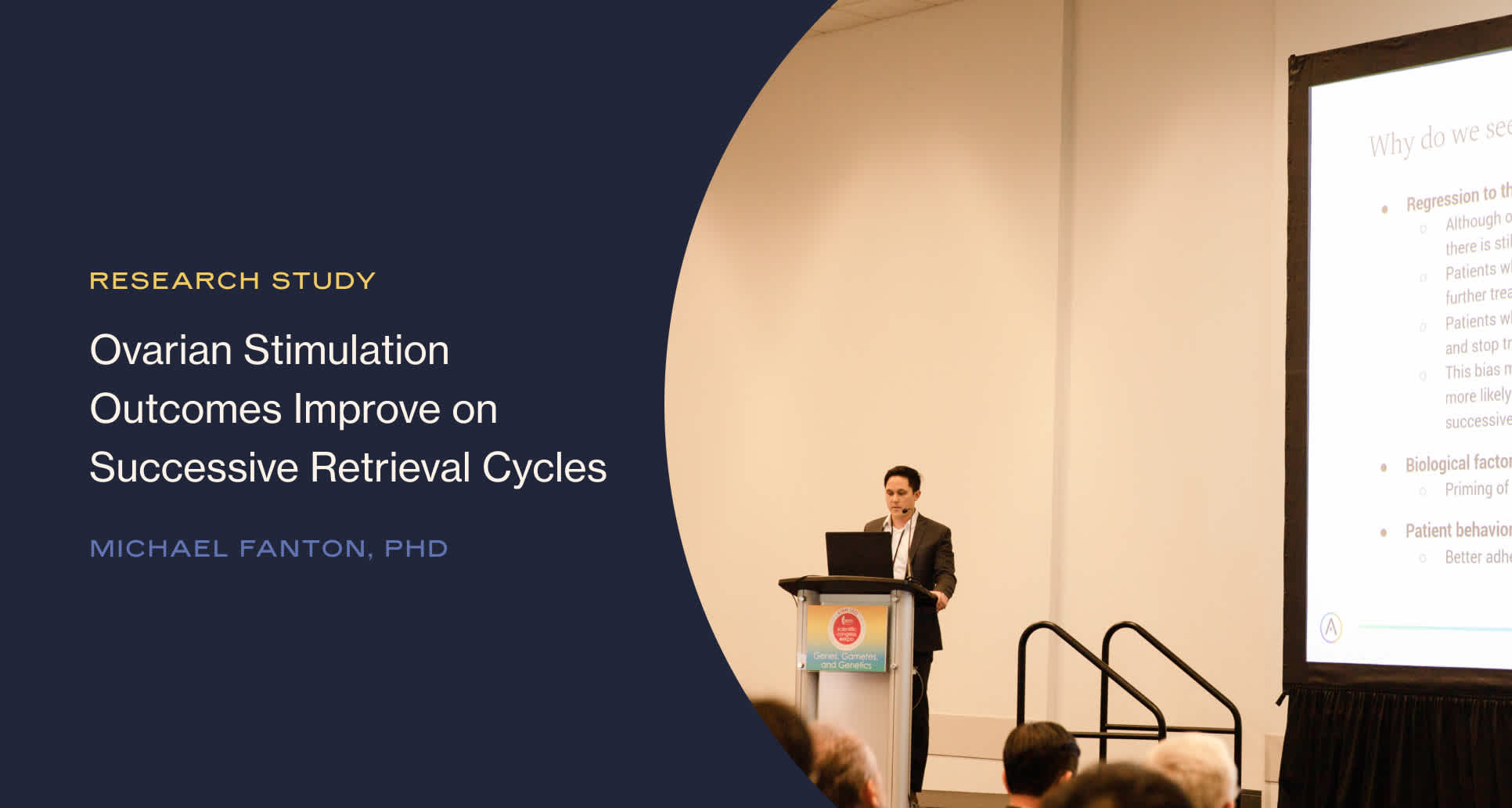What Outcome Can I Expect If I Need More Than One IVF Cycle?

Alife Data Scientist Michael Fanton, PhD, presented his research “Ovarian stimulation outcomes improve on successive retrieval cycles regardless of change in gonadotropin dose or protocol” in front of a live audience at the 2022 American Society for Reproductive Medicine conference this October. His research contributed to the development of Alife’s Stim Assist product, an AI-powered tool that supports doctors in clinical decision-making during an ovarian stimulation cycle.
We were glad for the opportunity to dive into Michael’s research to better understand what it means for people curious about IVF success rates! Read to learn more about the outcomes IVF patients can expect from successive IVF cycles, and how AI can use this information to improve IVF.
And for more information on ovarian stimulation and IVF medications such as gonadotropins, check out our blog!
Interview with Michael Fanton, PhD, Alife Data Scientist:
How many IVF cycles do most patients go through before they have a baby?
It may help to start with some terminology. An IVF “cycle” can refer to an egg retrieval cycle, a frozen embryo transfer cycle, or both (the retrieval cycle and following embryo transfers). Research has shown that only about a third of patients will have a live birth after one full IVF cycle. This means that most patients will have to go through multiple rounds of IVF before meeting their goals.
If the first retrieval cycle isn’t successful, does that mean that a patient’s chances of getting pregnant during the second retrieval cycle are lower?
If a patient isn’t successful on their first try, this does not necessarily mean that their chances of getting pregnant are lower for future cycles. There is a lot of variability in the IVF process and many factors that can affect outcomes, so it is very common for a patient to have poorer outcomes on one retrieval cycle but better outcomes on the next. Although there can be a lot of variability in how a patient responds on each retrieval, we have found that, on average, outcomes tend to improve on each successive attempt. We analyzed 65,000 patients who went through multiple IVF retrievals from 2014-2019 in the United States, and found that, on average, patients who choose to continue treatment retrieve slightly more eggs and blastocysts with each successive cycle. This improvement was observed for all patients groups of different clinical characteristics, regardless of treatment protocol or how the medication dose was changed.
Why do patients do better in successive cycles?
While we have observed that patients do better on successive retrieval cycles, we don’t know exactly why. There are likely a number of factors at play. Some doctors believe that there is a biological component – that the ovaries become “primed” and are more receptive to medication after an initial retrieval. Patients may also adhere better to the prescribed medication, and stress levels after the initial IVF retrieval cycle may be reduced, which could help improve outcomes. Lastly, there is a lot of randomness during the IVF process. Patients whose outcomes from a first retrieval cycle do not meet expectations are more likely to seek out further treatment, while patients who have better-than-expected outcomes are more likely to reach their pregnancy goal and stop treatment. This means that patients who “underperform” on an initial cycle are more likely to have better outcomes if they try again.
What implications does this research have on how AI can improve IVF?
A patient’s prior response to treatment is one of the most important factors a doctor will evaluate when deciding how to treat a patient. AI can be used to help understand how we can most effectively utilize knowledge from a patient’s prior cycles to inform treatment on a future cycle. For example, we are currently investigating how we can use AI algorithms to identify which ovarian stimulation protocol will be most effective based on a patient’s clinical characteristics and prior response to treatment.
For physicians and clinic operators, please reach out for a demo of Stim Assist – a set of AI-powered tools that enable reproductive endocrinologists to combine their clinical expertise with insights gathered from tens of thousands of past patient cycles to optimize starting dose of FSH and trigger day during a stimulation cycle. We’re always glad to hear from you!
Recent Articles
Share this
Recent Articles

Learn everything you need to know about IVF
Join the newsletter for IVF education, updates on new research, and early access to Alife products.



